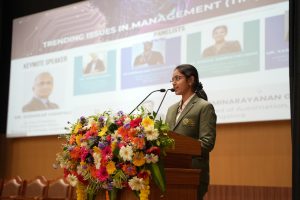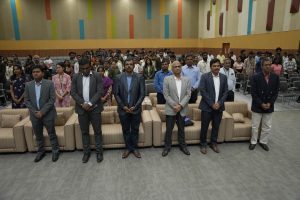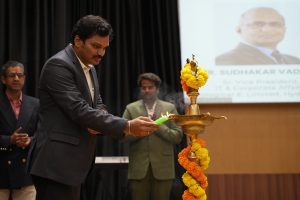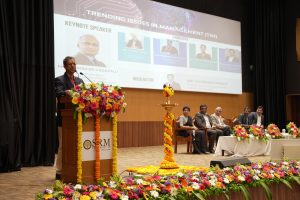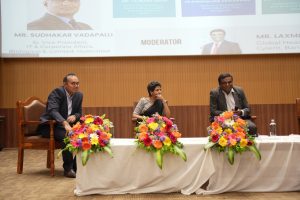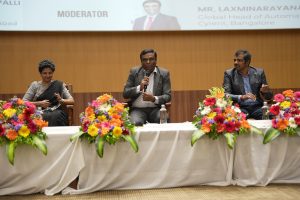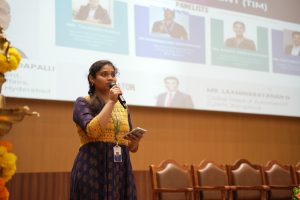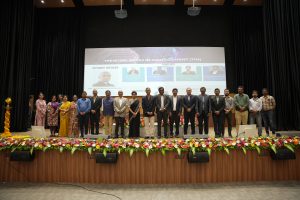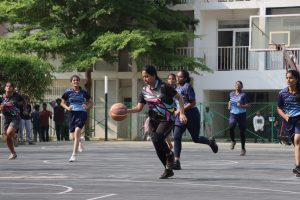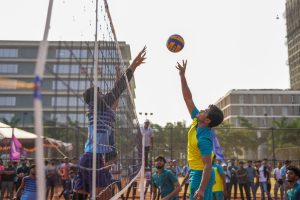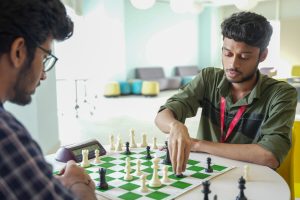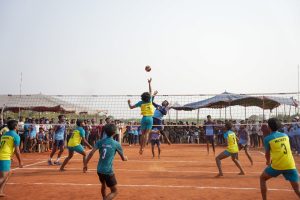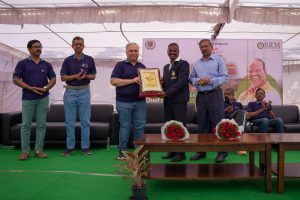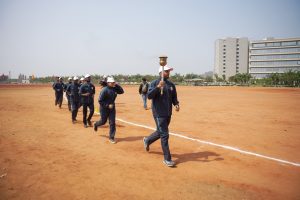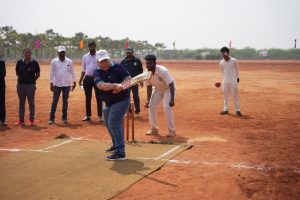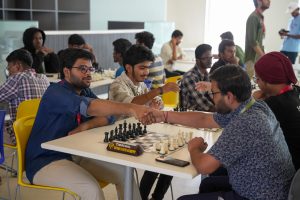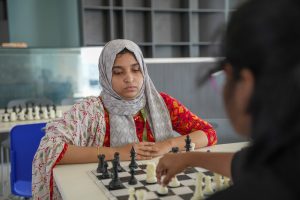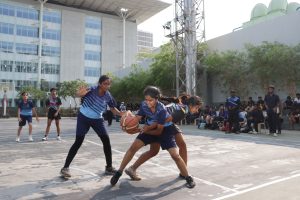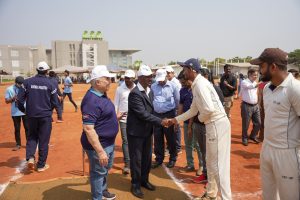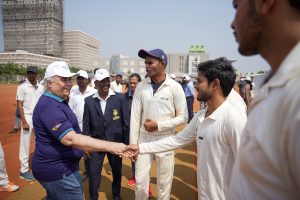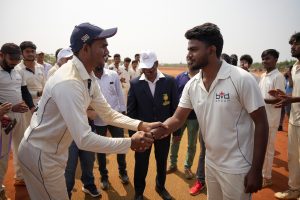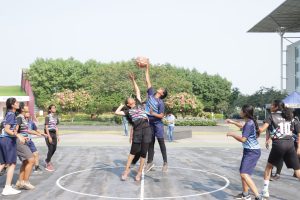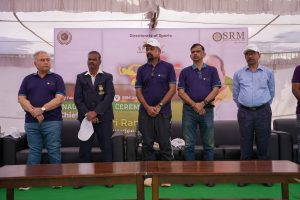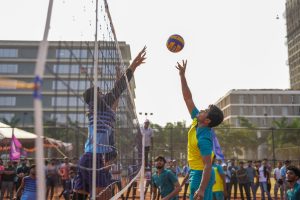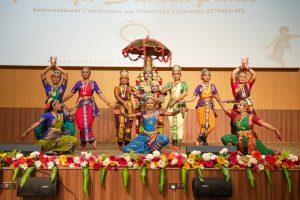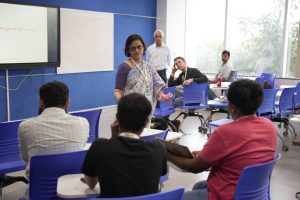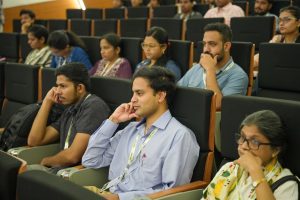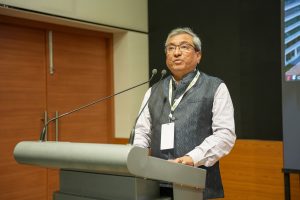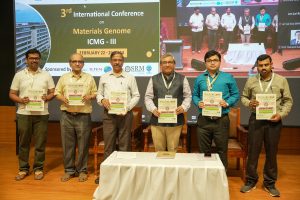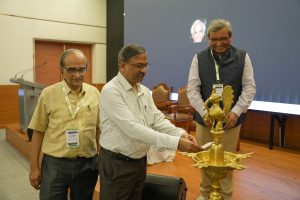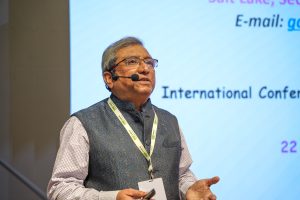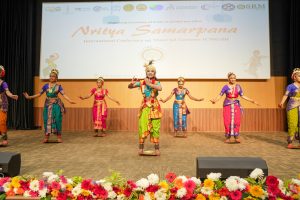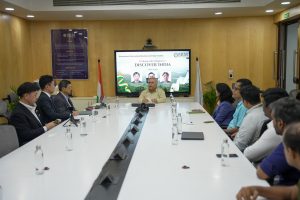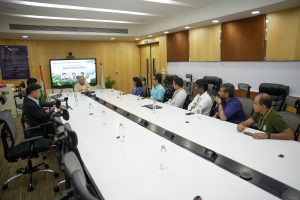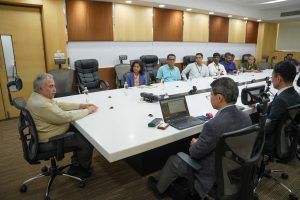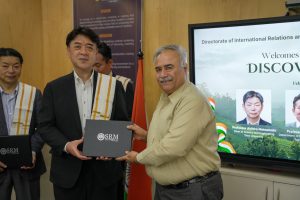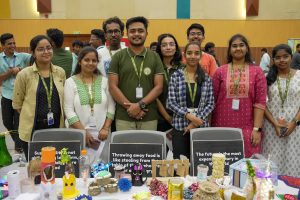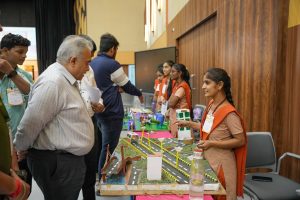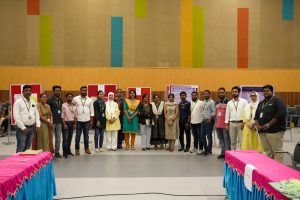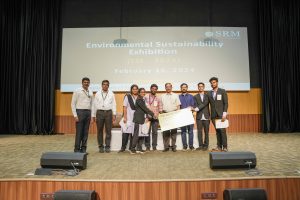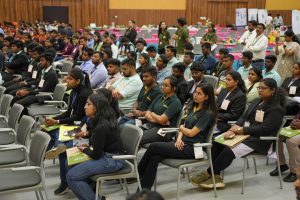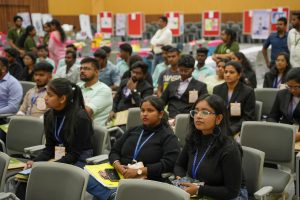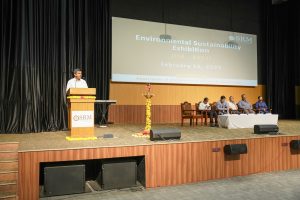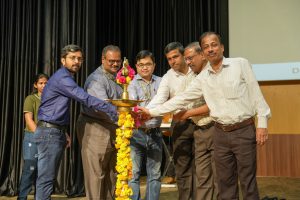Unveiling Literary Insights on Salman Rushdie’s The Moor’s Last Sigh
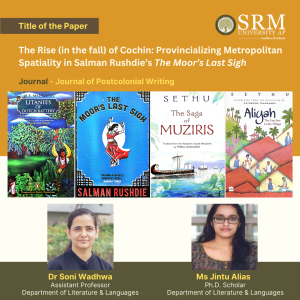 In a remarkable achievement, Dr Soni Wadhwa, Assistant Professor in the Department of Literature and Languages at SRM University-AP, and Ms Jintu Alias, a PhD Scholar, have made a significant contribution to the field of postcolonial studies with their paper titled “The rise (in the fall) of Cochin: Provincializing metropolitan spatiality in Salman Rushdie’s The Moor’s Last Sigh.”
In a remarkable achievement, Dr Soni Wadhwa, Assistant Professor in the Department of Literature and Languages at SRM University-AP, and Ms Jintu Alias, a PhD Scholar, have made a significant contribution to the field of postcolonial studies with their paper titled “The rise (in the fall) of Cochin: Provincializing metropolitan spatiality in Salman Rushdie’s The Moor’s Last Sigh.”
The paper, published in the highly esteemed Journal of Postcolonial Writing offering a fresh perspective on Salman Rushdie’s acclaimed novel, “The Moor’s Last Sigh.” Through their insightful analysis, Dr Wadhwa and Alias challenge the conventional notions of metropolitan spatiality and provide a nuanced understanding of the provincial city of Cochin.
Dr Soni Wadhwa and Jintu Alias, a promising PhD Scholar, have meticulously analysed Rushdie’s The Moor’s Last Sigh, shedding light on the complex dynamics of metropolitan spatiality and the rise and fall of Cochin within the narrative.
Their research explores Rushdie’s portrayal of Cochin, challenging traditional notions of metropolitan spaces and offering a fresh perspective on the provincial nation of such spatialities. This groundbreaking analysis delves deep into the layers of cultural, historical, and socio-political contexts within Rushdie’s work, showcasing the authors’ keen insights and critical thinking.
The publication of this paper highlights the invaluable contributions of our faculty and scholars in the field of literature and postcolonial studies. It is a testament to the rigorous academic environment and the commitment to excellence fostered at SRM University-AP.
We extend our warmest congratulations to Dr Soni Wadhwa and Jintu Alias for their remarkable achievement. Their dedication to research and passion for exploring the nuances of literature continue to inspire us all.
Explanation of the Research in Layperson’s Terms
Bombay/Mumbai is a great city widely celebrated in literature, especially for its cosmopolitanism. Salman Rushdie’s novel The Moor’s Last Sigh has been read by various critics for the richness of the portrayal of Mumbai. In their research, PhD scholar Jintu Alias and her PhD supervisor Dr Soni Wadhwa have analysed the representation of Cochin in the novel. Regarding their research they say, “For very long, Cochin’s presence has been eclipsed by that of Mumbai. But there is more to the novel than Bombay’s history. Like any art or literature, this novel is open to multiple interpretations. Our study is focused on the depiction of space in postcolonial literature with a focus on the island city Cochin in Kerala. When we immersed ourselves into the novel, we found that its charm is irresistible. Rushdie primarily opened a new city for other writers to explore. This novel was followed by several more novels that took an even closer look at the history of Cochin (now Kochi).”
Abstract
Indian fiction and critical engagements with it have a metropolitan bias. The preference for representations of big cities such as Mumbai in fiction means that non-metropolitan (“provincial”) spaces in India face neglect, literary and otherwise. This article argues for provincialising Indian fiction by exploring non-metropolitan locations as imagined in works of fiction to unpack alternative spatiality. The example offered is Salman Rushdie’s The Moor’s Last Sigh. In most readings of the novel, Bombay (along with Moorish Spain) is highlighted as a metropolitan model for India. Cochin does not figure in these readings, which are passed over as if just a random background or setting for the characters to be launched into Mumbai. This article addresses Cochin’s marginalisation by investigating how the island city offers a provincial, alternative, non-metropolitan theorisation of spatialities in Indian fiction. The larger objective is to make space for similarly marginalised non-European locales in the discourse of cosmopolitanism.
Social Implications
- We hope that with this interpretation of the novel from the point of view of Cochin and its history and cosmopolitanism, smaller cities in India get more attention from literary critics.
- We also hope that our research excites further studies and creative writing on other aspects of cultural traditions practised in smaller cities in India. There are many more themes and historical and geographical settings to explore in Indian literature!
Future Research
In continuation of our method of reading different Kochi texts, we will engage with more novels in the future. Our previous reading of another Kochi novel was published in Modern Jewish Studies in September 2023. We look forward to strengthening this body of work in the future.
About This Collaboration
PhD scholar Ms Jintu Alias and Assistant Professor Dr Soni Wadhwa have been working on this area of the Kochi novel since May 2021. This has been an exciting spatiality project in the context of Indian literature.
Citation
Alias, J., & Wadhwa, S. (2024). The rise (in the fall) of Cochin: Provincializing metropolitan spatiality in Salman Rushdie’s The Moor’s Last Sigh. Journal of Postcolonial Writing, 1-13. https://doi.org/10.1080/17449855.2024.2307408
- Published in Departmental News, English Current Happenings, News, Research News
PSB Hosts First Edition of Trending Issues in Management with Focus on AI
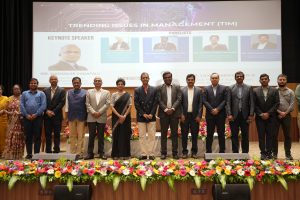 In a landmark event that marked the first edition of “Trending Issues in Management,” Paari School of Business at SRM University-AP brought together a stellar lineup of industry stalwarts to delve into the transformative world of Artificial Intelligence (AI). The conference aimed at unravelling the complexities, exploring the opportunities, and addressing the challenges posed by AI in the ever-evolving landscape of modern management.
In a landmark event that marked the first edition of “Trending Issues in Management,” Paari School of Business at SRM University-AP brought together a stellar lineup of industry stalwarts to delve into the transformative world of Artificial Intelligence (AI). The conference aimed at unravelling the complexities, exploring the opportunities, and addressing the challenges posed by AI in the ever-evolving landscape of modern management.
The event featured an elite panel of speakers, including Mr Sudhakar Vadapalli, Senior Vice President IT and Corporate Affairs, Biological E. Limited, Hyderabad, Saurabh Singh, Senior Vice President, Global Delivery Leader, Polestar Solutions, Delhi, Shriram Vasudevan (FIE, FIETE, SMIEEE), Technical Evangelist, Intel India Pvt Ltd, Bangalore, Laxminarayanan G, Global Head of Automation, Cyient, Bangalore, Karthiban Pandiyan MBB® PMP®, Leader Process Excellence, PwC India, Bangalore, and Ramya Sampathkumar, Independent Consultant and ex-Chief Digital Officer, Chennai.
They were joined by SRM AP’s esteemed members, Dr R Premkumar, Registrar, Prof. Bharadhwaj Sivakumaran, Dean of Paari School of Business, Dr CA Mahalakshmi Mudliar, and Mr Arun Prasad, offering a rich blend of theoretical insights and practical perspectives on AI’s impact on management.
Prof. Bharadhwaj Sivakumaran set the tone in his welcome speech, emphasising the school’s commitment to embedding Quality, Innovation, Customer-Centric Approach, and Ethics into its curriculum. “Our aim is to provide students with a contemporary education that is at the forefront of industry trends, particularly in AI and Blockchain, ensuring they are market-ready,” he stated.
Truly, considering the advent of technology in recent times, Paari school of Business is the first B-School in the country to include Artificial Intelligence and Blockchain as compulsory courses. It is also first in launching a Certificate Programme in Artificial Intelligence and Generative AI in Marketing.
Keynote speaker Sudhakar Vadapalli captivated the audience with his exploration of AI’s evolution, referencing Howard Gardner’s definition of intelligence and highlighting the rapid advancements leading to today’s sophisticated Large Language Models like ChatGPT. “The journey from Turing’s initial concepts to today’s AI showcases a trajectory towards an intelligence that might one day parallel human cognition,” Vadapalli remarked.
The subsequent panel discussion was a deep dive into AI’s role in reshaping management, highlighting the technology’s potential to enhance efficiency, innovate decision-making processes, and foster continuous learning and adaptation. Yet, the experts also cautioned about the challenges, particularly concerning data privacy, security, and the ethical use of AI.
The consensus among the panellists was clear: AI is not a fleeting trend but a fundamental shift reshaping the business landscape. Embracing this change requires new skills, such as Prompt Engineering and a proactive approach to the ongoing developments in AI technologies.
This seminal event underscored the importance of AI in contemporary management and positioned the Paari School of Business as a pioneering institution committed to integrating cutting-edge technologies into its academic fabric, preparing a new generation of leaders ready to navigate the AI-driven future.
- Published in Departmental News, News, Paari Current Happenings
Udgam 2024 – A Celebration of Sportsmanship and Excellence
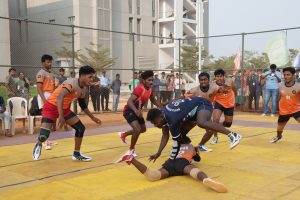 In a magnificent celebration of sports and camaraderie, SRM University-AP’s annual sports fest, Udgam-2024, unfolded with grandeur and an unwavering commitment to athletic excellence on February 29, 2024. The event was graced by dignitaries and sports aficionados, including the esteemed Chief Guest Mr. Nagapuri Ramesh, the renowned Dronacharya Awardee, Prof. Manoj K. Arora, Vice-Chancellor, along with other distinguished university officials, Dr R Premkumar, Registrar, Mrs Suma N, Chief Finance and Accounts Officer (CFAO), Prof. Vishnupad, Dean – Easwari School of Liberal Arts, Prof. Bharadhwaj Sivakumaran, Dean – Paari School of Business, Mr Anil Kumar Nigam, Director – Student Affairs, Dr. Sushmita Kumari, Assistant Director-Sports, Mr Manish Kumar Anand, Director – Human Resources, Mr Pankaj Belwariar, Director – Communications, graced the event with their presence. Around 800 students from 20 colleges and universities have participated in the fest.
In a magnificent celebration of sports and camaraderie, SRM University-AP’s annual sports fest, Udgam-2024, unfolded with grandeur and an unwavering commitment to athletic excellence on February 29, 2024. The event was graced by dignitaries and sports aficionados, including the esteemed Chief Guest Mr. Nagapuri Ramesh, the renowned Dronacharya Awardee, Prof. Manoj K. Arora, Vice-Chancellor, along with other distinguished university officials, Dr R Premkumar, Registrar, Mrs Suma N, Chief Finance and Accounts Officer (CFAO), Prof. Vishnupad, Dean – Easwari School of Liberal Arts, Prof. Bharadhwaj Sivakumaran, Dean – Paari School of Business, Mr Anil Kumar Nigam, Director – Student Affairs, Dr. Sushmita Kumari, Assistant Director-Sports, Mr Manish Kumar Anand, Director – Human Resources, Mr Pankaj Belwariar, Director – Communications, graced the event with their presence. Around 800 students from 20 colleges and universities have participated in the fest.
The word ‘UDGAM’, which translates to ‘origin’ or ‘to rise up’ in Sanskrit, perfectly encapsulates the spirit of SRM AP’s sports ethos. Not merely an extracurricular activity, sports at SRM University-AP are embraced as a pivotal element of student life, reflecting a holistic approach to education and personal development.
Prof. Manoj K Arora, in his inspiring address, articulated the university’s vision of elevating its sports facilities to international standards. “We are not just building facilities; we are nurturing the champions of tomorrow,” he remarked, emphasising the university’s plans to enhance its infrastructure, fostering a thriving environment for budding athletes.
The Chief Guest, Mr Nagapuri Ramesh, echoed the sentiment, highlighting the vital role of educational institutions in shaping the future of sports in India. His words, “India’s tryst with sports excellence begins in our universities,” resonated with the audience, underscoring the transformative power of sports in building discipline, resilience, and teamwork.
The event saw participation from over 800 students across 20 colleges from all over India, embodying the fest’s ethos of unity and competitive spirit. The Torch Bearing Ceremony, a symbolic tradition, ignited the flame of sportsmanship, passing the torch of legacy and determination from seasoned athletes to the emerging generation.
“I’m immensely grateful to the university management for granting me this incredible opportunity. Witnessing the spirited and joyous participation of the students fills us with exhilaration. SRM University-AP has truly set the stage for these young athletes to hone essential life skills such as leadership and team building. I urge all students to seize this momentous opportunity with both hands and make the most of it, embracing the challenge with the heart of a sportsperson and the zeal of a champion,” said Dr Sushmita Kumari, Assistant Director-Sports.
As the fest unfolds, athletes will compete in a plethora of events, from Basketball to Chess, football to Tennis, each game would be a testament to the indomitable spirit of the participants. The fest was not just a competition but a celebration of the enduring values that sports instil – teamwork, integrity, and the pursuit of excellence.
In conclusion, Udgam 2024 stands as a symbol of inspiration, urging students to embrace the spirit of sportsmanship, to learn from every game, and to always play with heart and honor. As Mr Ramesh poignantly stated, “Khiladi ya to jitta hai, ya sikhta hai, kavi harta nahi hai (In the arena of sports, we either win or learn; we never lose).”
- Published in News, Sports News, student affairs news
3rd ICMG Inauguration: Emerging Interfaces in Materials Genome
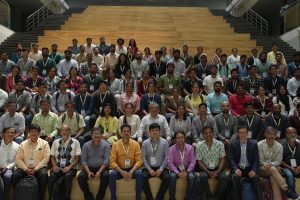 The third chapter of the biennial International Conference on Materials Genome (ICMG) was inaugurated at SRM University-AP, India on February 22, 2024, in the august presence of Prof G P Das, Research Institute for Sustainable Energy, India, Prof Yoshiyuki Kawazoe, Tohoku University, Japan, Prof Puru Jena, Virginia Commonwealth University, USA, Prof Jer Lai Kuo, Dr R Premkumar, Registrar, SRM University AP, Prof Ranjit Thapa, Dean-Research, Dr Pranab Mandal, Associate Professor & Head of the Department, Physics, Dr Mahesh Ravva, Associate Professor, Chemistry, Dr Pradyut Kumar Sanki, Associate Professor, Electronics and Communication Engineering and 150+ dignitaries across the world.
The third chapter of the biennial International Conference on Materials Genome (ICMG) was inaugurated at SRM University-AP, India on February 22, 2024, in the august presence of Prof G P Das, Research Institute for Sustainable Energy, India, Prof Yoshiyuki Kawazoe, Tohoku University, Japan, Prof Puru Jena, Virginia Commonwealth University, USA, Prof Jer Lai Kuo, Dr R Premkumar, Registrar, SRM University AP, Prof Ranjit Thapa, Dean-Research, Dr Pranab Mandal, Associate Professor & Head of the Department, Physics, Dr Mahesh Ravva, Associate Professor, Chemistry, Dr Pradyut Kumar Sanki, Associate Professor, Electronics and Communication Engineering and 150+ dignitaries across the world.
ICMG is set up to nurture and promote research and development activities in computational materials in association with Asian Consortium on Computational Materials Science (ACCMS), Jawaharlal Nehru Centre for Advanced Scientific Research, Bangalore (JNCASR), National Chemical Laboratory, Pune (NCL), Virginia Commonwealth University, USA, Indian Institute of Technology, Madras (IIT-M), Indian Institute of Technology, Bombay (IIT-B), TCG-Crest, Kolkata.
In his inaugural speech, Dr R Premkumar delved into the vision of SRM University-AP as a new-age research-centric university. Within 7 years of inception, SRM University-AP proudly harbours 20 departments across 3 schools, providing education to 8500 students. The university aspires to bring quality education to 15000 students in the near future. The research environment of the university is no less than excellent. The university strives to contribute to society through outstanding research activities. The premier faculty pool of the university with 100% PhD and international academic and industry exposure and the zeal to do quality research makes it a chosen haven for achievers. SRM University-AP supports its faculty and students in research by providing Seed Funding, Research Grants, Financial Assistance for Publications and Patents, Conference Aids and state-of-the-art research facilities. “The university’s mission is to create a newer generation who could substantially contribute to the academia and industry. Hence, we encourage our students with equal importance to take entrepreneurship, higher studies and/or Placement support as their future endeavours”, said Dr R Premkumar.
In his keynote speech, Prof. G P Das congratulated the University for the successful arrangement of the 3rd International Conference on Materials Genome. In the year 2000, the Asian consortium was born from a tea table discussion and has come a long way since. This consortium has become 25 years old, and they have been utilizing human as well as computational resources in different countries in the Asian region. The year 2024 marks the 60th year of the two most important milestone developments in the field of materials simulation – (i) Density Functional Theory by Walter Kohn and (ii) the landmark paper by Aneesur Rahman who is considered the founding father of computer simulation and molecular dynamics. It is exciting to note how the research in this domain has evolved in the years between. “One of the most recent additions to this is the marriage between materials science and computer science. This is also termed materials informatics or materials genomics. Big data, deep neural networks, reinforcement learning etc. are becoming more and more familiar tools for materials physicists and chemists. An increasingly large number of papers are appearing in the most prestigious peer-reviewed journals on the data-centric approach to discover as well as predict novel energy materials, catalytic materials, magnetic & spintronic materials, various kinds of functional materials and more recently topological materials,” asserted Prof Das.
Prof. Das further emphasised that there are a large number of areas that are being investigated with the aid of modern technologies like AI-ML. For example, the space group of a complex geological sample can be predicted just by looking at its X-ray or Neutron diffraction data using deep neural networks which was conventionally used to be done by Rietveld analysis, but now such inverse problems can be dealt with AI-ML. Such data-centric pattern-recognition approaches and their triumphs in predicting the behaviour of hitherto unknown areas e.g. cryptography, agriculture, and even criminology open up a bright new future ahead of us. Prof. Das concluded his speech by reminding us that we are now far ahead of our conventional ways of studying. The emerging ‘interface areas’ between disciplines such as biology and physics, economics & physics, metallurgy & physics, electronics & physics, mathematics & statistics, and many other suggests an enormous leap in computational approaches with advances in experimental measurements.
The Sub-themes of the conference for this year are Quantum Mechanics/Machine Learning Approach, High-throughput Computation and Machine Learning aided discovery of Materials, on which 6 keynote speeches and 46 invited lectures will be delivered in the coming 3 days. It is indeed heartening to see the conglomeration of so many stalwarts covering broad areas in Physics, Chemistry and Materials Science.
- Published in Departmental News, News, Physics News
SRM University-AP Hosts Japanese Delegation for a Culturally Enriching Exchange
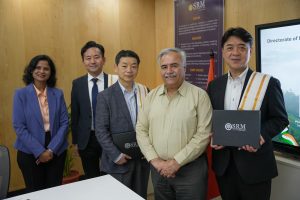 The Directorate of International Relations and Higher Studies recently welcomed distinguished delegations from Japan, the Land of the Rising Sun, for a fruitful academic and cultural exchange programme, “Discover India“.
The Directorate of International Relations and Higher Studies recently welcomed distinguished delegations from Japan, the Land of the Rising Sun, for a fruitful academic and cultural exchange programme, “Discover India“.
From February 21st to 24th, 2024, the university hosted Prof. Akihiro Matsumoto, Prof. Sho Yokota and Mr. Yutaka Kikuchi from Toyo University and Forum Engineering. Through interactive discussions and immersive sessions, the delegates gained valuable insights into Indian culture and traditions and promising opportunities for collaboration.
Discover India Programme is a transformative journey where innovation meets tradition. Witness the dawn of a new academic era, brimming with opportunities that promise to revolutionise our educational landscape. This enlightening gathering was more than a meeting of minds; it was a fusion of cutting-edge research and shared visions. The delegates engaged intimately with our esteemed faculty and brilliant research scholars from the Mechanical and Electrical and Electronics Engineering Departments, sparking dialogues that promise to kindle innovative research collaborations.
Their exploration of our state-of-the-art research facilities provided a window into the advanced realm of EV Research Technologies at SRM University-AP. The visit illuminated the potential for groundbreaking advancements in sustainable technology, reflecting our commitment to pioneering solutions for a greener future.
The academic engagement was beautifully complemented by industry visits to Efftronics Systems Pvt Ltd and Hindustan Coca-Cola Beverages Pvt Ltd, where practical insights and real-world applications bridged the gap between theoretical knowledge and industrial praxis.
Culminating the visit, our guests were immersed in the rich tapestry of Indian culture, exploring the serene Amaravati Buddha Statue, the sacred Amareswara Swami Temple, and the historic Durga Temple in Vijayawada. This cultural odyssey not only showcased the heritage of our region but also fostered a deeper mutual respect and understanding, enriching the fabric of our international collaboration.
As we reflect on these three days of intellectual exchange, cultural immersion, and visionary exploration, we are filled with hope and excitement for the future collaborations that will undoubtedly emerge from this fertile groundwork. We stand on the brink of a new dawn in global education, ready to innovate, inspire, and transform together.
- Published in Departmental News, IR-News, News
Advocating for Change: Shedding Light on the Struggle of Acid Attack Survivors
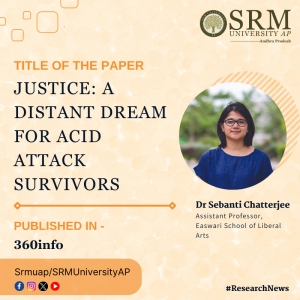 In a thought-provoking paper titled “Justice A Distant Dream for Acid Attack Survivors,” published in 360 Info, Dr Sebanti Chatterjee, Assistant Professor in the Department of Liberal Arts, delves deep into the persistent challenges faced by acid attack survivors.
In a thought-provoking paper titled “Justice A Distant Dream for Acid Attack Survivors,” published in 360 Info, Dr Sebanti Chatterjee, Assistant Professor in the Department of Liberal Arts, delves deep into the persistent challenges faced by acid attack survivors.
Despite the existence of legal provisions aimed at addressing gender-based violence, the harrowing reality is that acid attacks continue to be a stark and under-addressed form of violence. Dr Chatterjee’s paper sheds light on this critical issue, highlighting the urgent need for greater awareness, support, and legal reform to provide justice and support for survivors.
Through her research, she underscores the importance of recognising and prioritising the plight of acid attack survivors, urging for collective action to create meaningful change. As advocates for social justice, it is imperative that we amplify their voices and work towards a future where justice is not a distant dream but a tangible reality for all survivors.
Abstract
Acid attacks can occur in private or public. These attacks are often rooted in ‘jilted lover’ syndrome or as a manifestation of continued domestic violence. Few cases offer a different narrative: one woman was attacked to teach her father a lesson about property disputes. Ultimately, the acid attack is yet another demonstration of patriarchy’s brutishness.
My (unpublished) research in 2021 with acid attack survivors (including Rima), lawyers, police and other stakeholders in West Bengal — as part of a collaboration between National Human Rights Commission and National Law School of India University, Bangalore — found that despite these various legal advances, acid attack as a form of violence is not prioritised as an issue needing immediate attention, unlike rape and child trafficking.
DOI: 10.54377/e719-077c
Future Research Plan
To explore how a state cultural heritage status makes us explore the social life of an instrument- it’s secular and sacred manifestations, questions of labour, gender and the sustainability model pertinent to its musical and material interpretations.
Topic of research
Soulful beats: Ecology, Labour and Aesthetics of Ghumott
- Published in Departmental News, Liberal Arts News, News, Research News
SRM AP and TITAN COMPANY LIMITED Jointly Filed an Industrial Patent
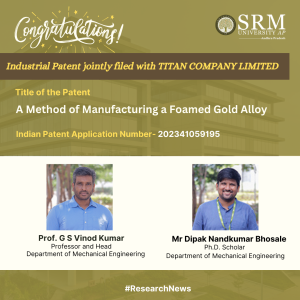 SRM University-AP and TITAN COMPANY LIMITED, a leading jewellery brand in India, have collaborated to engineer novel jewellery products using advanced materials and technologies. The joint research project, led by HOD Prof. G S Vinod Kumar and Ph.D. Scholar Dipak Nandkumar Bhosale, Department of Mechanical Engineering, has resulted in a new method of manufacturing foamed gold alloy that is lighter, stronger, and more durable than conventional gold jewellery.
SRM University-AP and TITAN COMPANY LIMITED, a leading jewellery brand in India, have collaborated to engineer novel jewellery products using advanced materials and technologies. The joint research project, led by HOD Prof. G S Vinod Kumar and Ph.D. Scholar Dipak Nandkumar Bhosale, Department of Mechanical Engineering, has resulted in a new method of manufacturing foamed gold alloy that is lighter, stronger, and more durable than conventional gold jewellery.
A joint patent between SRM University-AP and TITAN COMPANY LIMITED has been filed for this innovative method of manufacturing foamed gold alloys. The jewellery products made from this material are currently available in TITAN showrooms under the brand name TANISHQ. The customers can enjoy the benefits of wearing lightweight and high-strength jewellery, which also has a high aesthetic appeal and value.
The collaboration between SRM University-AP and TITAN COMPANY LIMITED exemplifies how academia and industry can work together to create novel and useful products for society. The joint research project also provides an opportunity for the students and faculty of SRM University-AP to gain exposure and experience in the field of jewellery engineering and design and to contribute to advancing science and technology.
Abstract
The current innovation introduces a method for producing foamed gold alloy utilising a liquid metallurgical approach. Gas-releasing agents such as hydrides and carbonates are employed in the manufacturing process. Both 18K and 22K alloys are subjected to foaming in this invention. The resulting foams are stabilised by oxides generated in-situ as well as oxides added externally. These foamed gold alloys exhibit ultra-lower density. The foaming process is successfully executed using both interrupted and uninterrupted methods. These foamed gold alloys find applications in various fields including Jewellery and medical implants.
The title of patent in the citation format
“G. S. Vinod Kumar, Dipak Nandkumar Bhosale. A METHOD OF MANUFACTURING A FOAMED GOLD ALLOY. Indian Patent application number 202341059195 filed Sep 04, 2023”
Patent Application number
202341059195
Inventors
1. G. S. Vinod Kumar 2. Dipak Nandkumar Bhosale
- Published in Departmental News, Mechanical Engineering NEWS, News, Research News
Journey Through Time: Discovering BA History Course Details
Unearthing Histories: Explore BA History Course Details
History is the majestic tapestry upon which humanity paints its legacy. It’s a canvas woven with tales of triumphs, conflicts, and the evolution of societies. Studying history isn’t merely peering into the past; it’s an odyssey through the corridors of time, a journey that unveils the secrets of civilisations and the threads that connect the present to the bygone eras. It’s the cornerstone of understanding our world’s complexities. It is a multidimensional exploration that dissects the past through diverse lenses.
A Bachelor of Arts (BA) in History is an undergraduate degree programme focusing on the study of the past, exploring events, societies, cultures, and their evolution over time. Typically, it involves coursework covering various periods, regions, and themes in history. This course is a gateway to unravelling the mysteries of culture, power, and human behaviour, illuminating pathways to comprehend the present and shape the future. Also, it provides a foundation for various career paths, as mentioned earlier, by cultivating transferable skills highly valued in multiple sectors.
Moreover, movie houses have a high demand for history experts who can conduct research on costumes, jewellery, and movie sets. Collaborating closely with directors and cinematographers, these experts may also pursue roles as research analysts in production houses. Let’s dive into BA History course details.
BA History Course Details
BA History Eligbility:
The typical eligibility requirements for a Bachelor of Arts (BA) in History include:
- Completion of 10+2 or an equivalent from a recognized board like CBSE or ICSE
- Attainment of at least 50% aggregate marks in the qualifying examination
- Acceptance of students from any academic stream into the BA History program
- Some universities might stipulate prior study of History at the 10+2 level.
Preference is often given to candidates from a Humanities background. Individual institutes may have unique eligibility criteria. For instance, DU Admissions mandates that applicants have passed Mathematics at the qualifying level.
BA History Duration:
The BA History programme spans three years and delves into the evolution of human civilization across ancient to modern eras. Exploring diverse cultures, it scrutinizes both the accomplishments and shortcomings, unravelling the tapestry of achievements and setbacks throughout history.
Jobs After BA History
A BA in History can open doors to various career paths due to the skills it develops, such as critical thinking, research, analysis, and communication. Some career options include:
- Museum Curator/Archivist
- Historical Researcher
- Education
- Journalism/Writing
- Government & Public Service
- Librarian
- Heritage Manager
- Consultancy/Analysis
Many careers might require further education, specialized training, or internships. Consider supplementing your BA with internships, certifications, or even pursuing higher education like a Master’s or Ph.D. in History or related fields to enhance your prospects in certain career paths.
BA (Hons) in History at SRM University-AP – Nurturing Legacy Explorers
The School of Liberal Arts and Social Sciences at SRM AP presents a BA (Hons.) in History, aiming to provide students with comprehensive knowledge of global and Indian history. The programme challenges the conventional view of history as a mere chronicle of dates and personalities.
Emphasizing diverse perspectives on historical events encourages critical thinking and analysis. Through intensive reading and tutorial sessions, students engage deeply with historical texts, fostering a nuanced understanding. Evaluation at SRM University-AP emphasizes presentations, ensuring a dynamic and insightful exploration of the multifaceted nature of history.
BA History Subjects List at SRM University-AP
Semester 1:
• Art of Listening, Speaking, and Reading Skills
• Environmental Science
• Digital Literacy
• Understanding Indian Society(ies): Myths and Realities
• Understanding the Indian Constitution
• Understanding Human Minds
• Emerging Technologies
Semester-2:
• Effective Writing and Presentation Skills
• Universal Human Values and Ethics
• Analytical Reasoning and Aptitude
• Economics in Everyday Life
• Data Analytics for Social Sciences
• Human Civilizations
Semester-3:
• Creative and Critical Thinking Skills
• Co-Curricular Activities
• Community Service and
• Social Responsibility
• Entrepreneurial Mindset
• Middle Ages in Europe
• European Social Formations
Semester-4:
• Leadership and Teamwork
• Community Service and Social Responsibility
• Social Entrepreneurship
• Early Medieval India
• Medieval India (1200-1500)
• History of Central Islamic Lands
• Age of Revolutions and National Liberation
Semester-5:
• Community Service and Social Responsibility
• Career Skills- I
• Medieval India – II
• Introduction to Colonial Latin America and the Caribbean
• Economic History of Modern India (1757-1947)
Semester-6:
• Community Service and Social Responsibility
• Entangled Histories
• Understanding Caste
• Society, Politics, and Economy: India After Independence
• Introduction to Colonial Africa
Semester 7 & 8:
• Seminars and Dissertation
Wrapping Things Up
Take up an illuminating journey through the annals of time with SRM University-AP’s BA (Hons) History programme. The multidimensional curriculum doesn’t just decode the past; it fosters critical thinking and analysis. Join the university to explore diverse perspectives and unveil the rich tapestry of history. Embrace a future shaped by a nuanced understanding of civilizations. Start your transformative journey by applying today.
- Published in Academics, Blog, Liberal Arts
ESE 2024: Promoting Environmental Sustainability Through Innovation
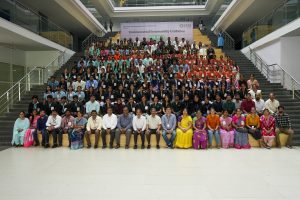 In a remarkable display of commitment towards environmental sustainability, the Department of Environmental Science and Engineering successfully organised the ESE 2024 event. The primary objective of this event was to create awareness and encourage innovative solutions for addressing environmental challenges.
In a remarkable display of commitment towards environmental sustainability, the Department of Environmental Science and Engineering successfully organised the ESE 2024 event. The primary objective of this event was to create awareness and encourage innovative solutions for addressing environmental challenges.
More than 150 enthusiastic undergraduate students from Gujarat, West Bengal, Uttarakhand, Odisha and Tamil Nadu participated in the event. Their active involvement exemplified the youth’s growing interest and concern for environmental issues.
After a highly competitive and captivating competition, the winners were finally announced. The first prize was awarded to Andhra Loyola College, the second prize went to Natubhai V. Patel College of Pure Applied Sciences, and the third prize was claimed by Government Autonomous College, Rourkela.
The winners were not only recognised for their outstanding performances but also received substantial cash prizes. The first-place winner was awarded a cash prize of INR 30,000/-, the second-place winner received INR 20,000/-, and the third-place winner was granted INR 10,000/-.
Additionally, consolation prizes of INR 5,000/- each were distributed to students securing positions from 4th to 10th. Recipients included students from Manipal Academy of Higher Education, Doon Business School, Saveetha Institute of Medical and Technical Sciences (SIMATS), Central University of Tamil Nadu, Sri Durga Malleswara Siddhartha Mahila Kalasala, Nehru Arts and Science College, and SRR & CVR Govt. Degree College.
The ESE 2024 event served as a platform for young minds to showcase their talents and exchange ideas, engage in meaningful discussions, and collaborate on initiatives aimed at promoting environmental sustainability. The exhibition featured a diverse range of projects spanning areas such as renewable energy, waste management, conservation efforts, and sustainable agriculture, among others.
- Published in Departmental News, ENVS News, News
Dr Dhamodharan Invited for Workshop on Youth Leadership
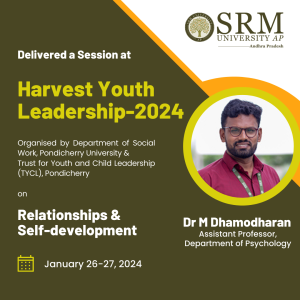 Dr M Dhamodharan, Assistant Professor in the Department of Psychology, was invited as a resource person to deliver a session on “Relationship and Self Development “from January 26-27, 2024, at the Two Days workshop on “Harvesting Youth Leadership-2024.”The workshop was organised by the Department of Social Work at Pondicherry Central University in collaboration with the Trust for Youth and Child Leadership (TYCL), Pondicherry.
Dr M Dhamodharan, Assistant Professor in the Department of Psychology, was invited as a resource person to deliver a session on “Relationship and Self Development “from January 26-27, 2024, at the Two Days workshop on “Harvesting Youth Leadership-2024.”The workshop was organised by the Department of Social Work at Pondicherry Central University in collaboration with the Trust for Youth and Child Leadership (TYCL), Pondicherry.
Dr Dhamodharan’s expertise and insights on the topic added value to the workshop, which aimed to empower young individuals and cultivate leadership skills among the youth. The session provided a platform for participants to delve into the dynamics of relationships and personal growth, essential aspects for nurturing effective leadership qualities.
His contribution towards the event underscored the importance of understanding the link between relationships and self-development in the context of youth leadership.
Abstract
Relationship is a continuing and often committed association between two or more people, as in a family, friendship, marriage, partnership, or other interpersonal links in which the participants influence each other’s thoughts, feelings, and actions (APA,2020).
The connections we set up, the several types of love we meet, and the effects these interactions have on our personal development all have a significant impact on how we live as people. Understanding the many kinds of relationships that exist is the first step in any analysis of relationships.
Every sort of relationship, whether it be sexual or platonic, professional or familial, has its own dynamics, obstacles, and expectations. In the context of human relationships, love manifests as a complex and profound energy. Love affects the core of who we are and transcends cultural barriers in all its manifestations. Numerous love typologies have been proved by academics and psychologists to classify and understand these types. Love has many sides, ranging from the Greek concepts of Agape, Eros, and Philia to contemporary psychiatric theories. This investigation looks at the subtle differences between various kinds of love, emphasising the behavioural, cognitive, and emotional aspects of each.
A foundational work in the field of psychology, Sternberg’s Triangular Theory of Love is at the core of understanding love. According to this theory, love can be viewed as a triangle made up of three essential elements: commitment, passion, and intimacy. It explores the significance of each ingredient and how they interact to shape the different manifestations of love through a thorough investigation of Sternberg’s theory. The talk explains the practical applications, providing a window into how the theory may be used to understand and negotiate the intricacies of real-world interactions.
Furthermore, a comprehensive knowledge of the human experience requires the inclusion of self-development in the conversation about love and relationships. In all their manifestations, relationships function as mirrors that reflect our advantages, disadvantages, and potential growth areas. The reciprocal effects of relationships, love kinds, and self-development are particularly important in human life. Also explains. how people change because of their relationships, moulding and honing their identities to fit the demands of romantic relationships and close relationships.
Finally, this session might give light on the complex interactions that exist between self-development, Sternberg’s Triangular Theory, love categories, and relationship types. Participants may understand more about the complex interplay between love and personal development as well as the enormous impact that connections have on forming our identities by exploring these interconnected domains. This talk might give insightful guidance for the participants to navigating the intricate web of interpersonal interactions, supplying a road map for cultivating meaningful connections and promoting comprehensive self-development.
- Published in Departmental News, News, Psychology News


